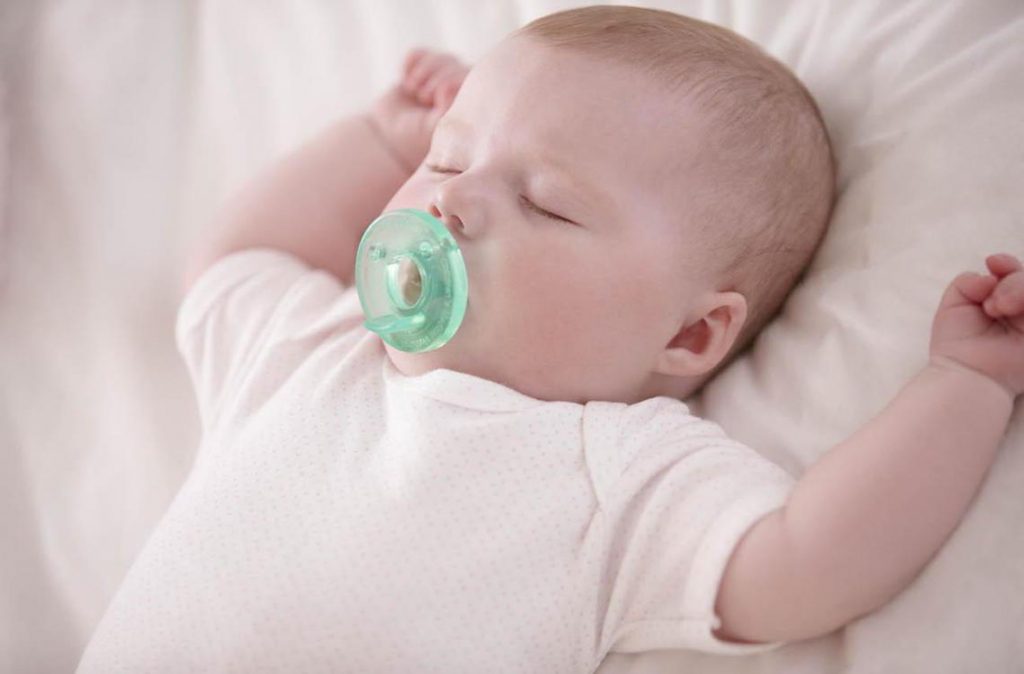Pacifiers –you’ve probably used one as a baby, and now you’re wondering if you should get one for your baby. They can be very useful and are often touted for their calming effects on babies. Since babies have a strong suckling reflex, sucking a pacifier can let them feel safe and content between feedings.
Are pacifiers really recommended for your baby, though? What are important tips for choosing a pacifier if you decide on one for your baby? Read ahead to find out more, and remember mother knows best!
Benefits of Pacifier Use
For many babies and parents, pacifiers are the key to fuss-free contentment. The advantages include:
1. Say No to fussy babies!
Babies wouldn’t be babies if they aren’t a handful to calm down. Sometimes a pacifier can be an effective tool to distract and soothe them.
A pacifier may also be a handy distraction during blood tests, clinic visits and procedures. Pop the pacifier in before your baby gets a jab and you might notice that your baby barely makes a sound!
2. A Bedtime Boost
Staying up all hours because your baby won’t fall asleep? A pacifier may do the trick. Pacifiers do not affect the length of your baby’s sleep and merely help him or her fall asleep.
Highlighted
3. Reducing the risk of sudden infant death syndrome (SIDS)
Using a pacifier during naptime and bedtime may reduce the risk of SIDS. However, wait until your baby is at least 3-4 weeks old before offering a pacifier.
4. Fuss-free flights with the little one
As babies don’t know how to “pop” their ears by yawning during flights, sucking on a pacifier may help alleviate ear pain due to pressure changes. This will be handy if your little one is a jetsetter!
Cons of Pacifier Use
1. Nipple Confusion
Pacifier use, if convened too early, may lead to less frequent breastfeeding or early weaning as babies can be sensitive to the difference in the sensations between sucking on a pacifier or sucking on a breast. However, reviews of recent studies have shown that pacifiers do not impact the duration and continuation of breastfeeding. All in all, it’s an individual choice that you can make based on your little bundle of joy.
2. Addicted to the Pacifier
This is another big problem for pacifier use- and babies often don’t take kindly to weaning off their pacifiers. If your baby relies on pacifiers for sleep and contentment, you might face crying spells whenever the pacifier falls out of your baby’s mouth.
The drawbacks of pacifier use increase with age and begin to outweigh the benefits by the time your child is 4. Many children stop on their own volition, but others might need help to break the habit.
3. Middle Ear Infections? Oh no!
However, rates of middle ear infections in babies are the lowest from birth to 6 months – which coincides with the highest risk of SIDS. Do your math, moms!
4. Pacifier Teeth
Prolonged pacifier use may lead to dental issues in the long run. Normal usage of pacifiers in the first few years of life normally don’t cause any long-term dental headaches, but prolonged use can lead to misaligned teeth or teeth not erupting properly. Hence, try not to let your baby use a pacifier for too long to avoid future stressful visits to the dentist! However, there are now orthodontic pacifiers that are designed to prevent this issue.
Tips and tricks to pacifier use
If you do decide to offer your little one a pacifier, do take note of these tips:
· Wait until breastfeeding is established
For mothers who are nursing, ensure that your baby has settled into an effective nursing routine before offering a pacifier. This will prevent your baby from having nipple confusion.
· Try other methods of soothing your baby first
Don’t use a pacifier as the first line of defence! (This can lead to an unhealthy dependency on pacifiers). Try other things such as rocking your baby to calm a fussy baby. Preferably, offer pacifiers to your baby only after feedings.
· Choose a silicone one-piece pacifier
Pacifiers with two parts may break and pose a choking hazard. A silicone one-piece is the safest. Your baby may like different sizes or firmness, so once you’ve selected a favourite, make sure you have a few identical ones handy as a backup. You don’t want to lose a pacifier after the store’s closed, or you’ll have a rough night getting the bundle of joy to bed!
· Keep it clean!
Remember to clean your baby’s pacifier thoroughly. Before 6 months, icky germs can attack your baby’s developing immune system, so boil the pacifiers to clean them.
After your baby is 6 months old, it’s fine to wash them with soap and water. Also, don’t ever coat the pacifier with sweet substances to entice your baby.
· Keep it safe!
Replace pacifiers often and watch for loose parts, tears or deterioration. Also, do not attach pacifiers to strings, which may get caught around your baby’s neck.
DoctorOnCall is Malaysia’s first Online Clinic that allows chat, phone, and video calls directly with a registered Malaysian doctor at www.DoctorOnCall.com.my DoctorOnCall also provides affordable medication delivery to your doorstep.
Facebook: https://www.facebook.com/doctoroncallMY
Instagram: https://www.instagram.com/doctoroncallmy
